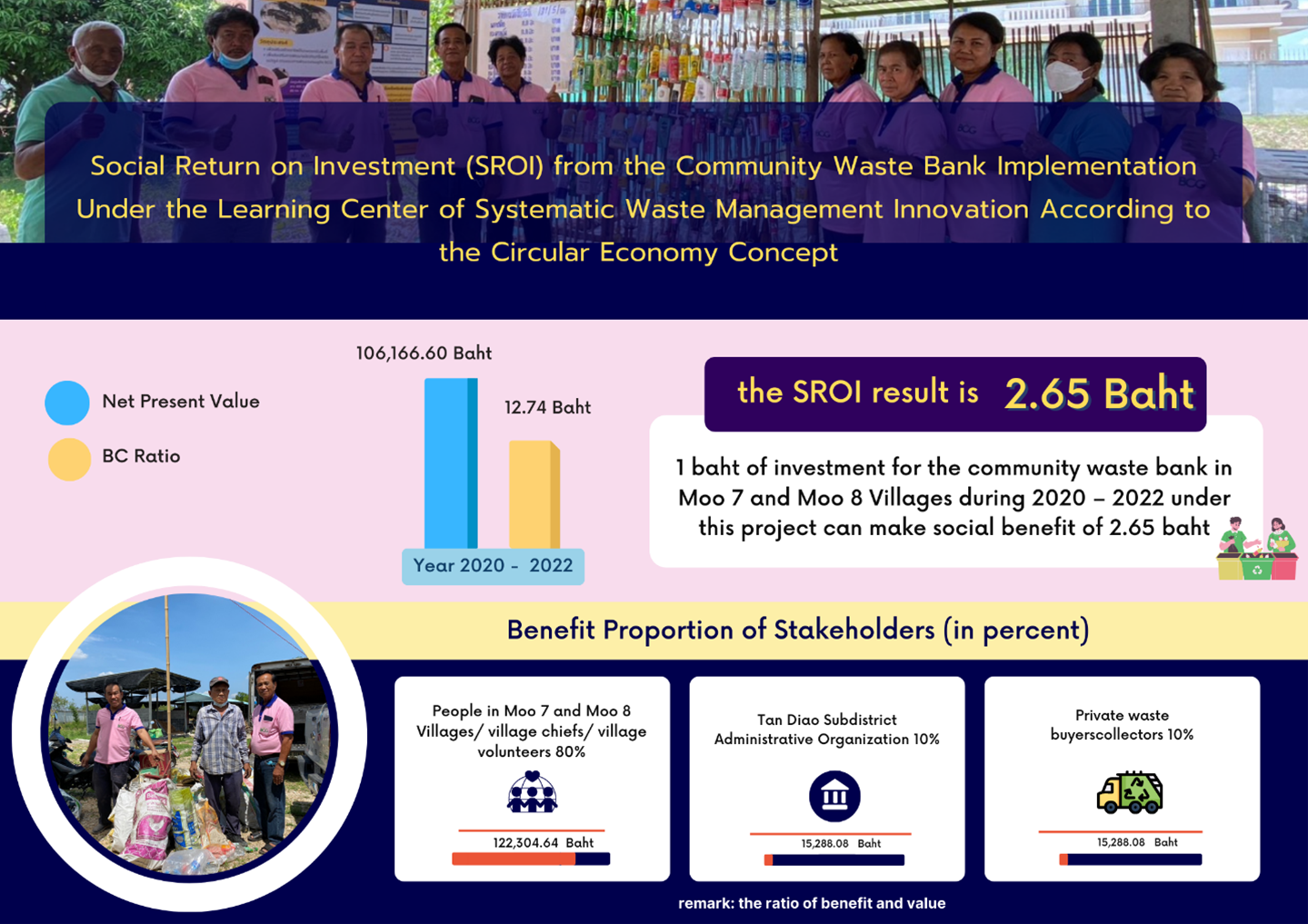Social Return on Investment (SROI) from the Community Waste Bank Implementation under the Learning Center of Systematic Waste Management Innovation According to the Circular Economy Concept
Main Article Content
Abstract
This article presents the results of social return on investment (SROI) evaluation in the community’s waste bank program implemented in the Moo 7 and Moo 8 Villages of Tan Diao Subdistrict, Kaeng Khoi District, Saraburi Province during 2020–2022, which is a part of the Learning Centre of Systematic Waste Management Innovation According to the Concept of Circular Economy project. This research employed participatory action research to collect data on total cost for investment and income from selling recyclable waste through in-depth interviews and focus groups with a total of 40 stakeholders including: 25 community members, 5 community leaders, 3 representatives from Tan Diao Subdistrict Administrative Organization, 5 village health volunteers, and 2 private waste buyers. The SROI analysis of the Moo 7 and Moo 8 waste banks (2020–2022) by using the discount rate based on the government bond yield at 3% shows the total net present value at 106,166.60 Thai Baht (2,941.76 USD), a ratio of cost-benefit analysis at 12.74 times, the payback period at 4.7 months, and the SROI result is 2.65 Thai Baht (0.073 USD). In other words, for every 1 Thai Baht invested in the community waste banks during this period, the benefits generated were equivalent to 2.65 Thai Baht (0.073 USD). This translates to a positive return on investment. The contribution of community waste bank under the project, can significantly change in 1) community relations with an intensive engagement in community waste management, 2) economic perspective as it generates employment and income, and reduces transportation costs for landfilling, and 3) environment term, as it reduces household waste and waste disposal. The suggestions have been developed in terms of policies and action plans for community waste management together with local administrative organizations to develop Tan Diao Subdistrict as a model of waste management.
Article Details

This work is licensed under a Creative Commons Attribution-NonCommercial 4.0 International License.
Published articles are under the copyright of the Applied Environmental Research effective when the article is accepted for publication thus granting Applied Environmental Research all rights for the work so that both parties may be protected from the consequences of unauthorized use. Partially or totally publication of an article elsewhere is possible only after the consent from the editors.
References
Banke-Thomas, Madaj, Cherles, and Van Den Broek. (2015). Social Return on Investment (SROI) Methodology to Account for Value for Money of Public health Interventions: A Systematic Review. BMC Public Health.
Chula Zero Waste. (2563). Circular Economy and Sustainable Waste Management: Different or the Same? (1). Retrieved from http://www.chulazerowaste.chula.ac.th/cemeeting1-1/.
London Business School. (2004). Measuring Social Impact: The Foundation of Social Return on Investment (SROI). London:Nef, small business service.
Social Value International. (2017). Social Return on Investment: SROI, SOCIAL VALUE THAILAND, 61.
Pasiphol, S. (2017). Social Return on Investment (SROI). Journal of Education studies, 45(4), 343-353.
Pollution Control Department. (2019a). Data about Situation of Solid Waste in the Country. Retrieved from https://thaimsw.pcd.go.th/report1.php?year=2561.
Pollution Control Department. (2019b). Information System in Solid Waste Management in Communities. Retrieved from https://thaimsw.pcd.go.th/localgovdetail.php?id=626.
Pollution Control Department. (2019c). Report on Pollution Situations in Thailand in 2018. Retrieved from http://www.pcd.go.th/file/AW-Pollution-Report2018.pdf.
Pollution Control Department. (2020). Situation of Environment Quality in Thailand in 2019. Retrieved from http://pcd.go.th/Public/News/GetNewsThai.cfm?task=lt2020&id=19259.
Pollution Control Department. (2020b). Situation of Environment Quality in Thailand in 2020. Retrieved from https://www.pcd.go.th/pcd_news/11873/.
Pollution Control Department. ROADMAP in Management of Solid Waste and Hazardous Waste. Retrieved from http://nfofile.pcd.go.th/waste/RoadmapbkCFlD=755237KON=47014 796.
Thai Health Promotion Foundation. (2014). Social Return on Investment (SROI): A Case Study on Implementation of Thai Health Promotion Foundation. (1st ed.). Bangkok: Thai Health Promotion Foundation.
Social Return on Investment (SROI). (2019). Chief Transformation and Strategic Office (CTS), Chulalongkorn University.
Khongprasertamorn, P. (2013). Analysis of Social Return on Investment of the State Enterprise in Samut Song Khram Province. Master Thesis in Science, National Institute of Development Administration, Bangkok.
Riyakhan, P. (2004). Components of Social Return on Investment (SROI). Phetchabun Rajabhat Journal, 19(2), 4.
Environment Office 7 (Saraburi) (2020). Report on Situation of Solid Waste Disposal Sites in 2020, Saraburi Province. Saraburi: Environment Promotion Unit, Environment Office 7 (Saraburi).

